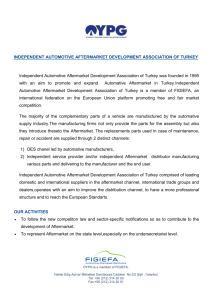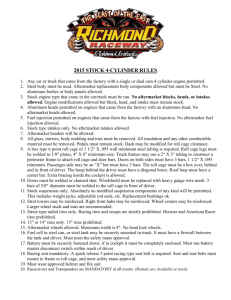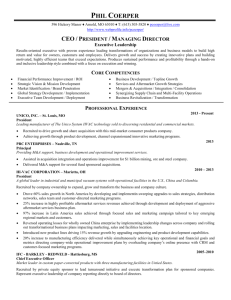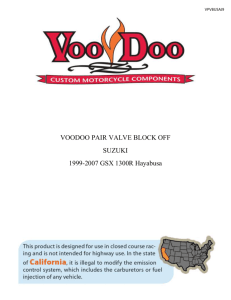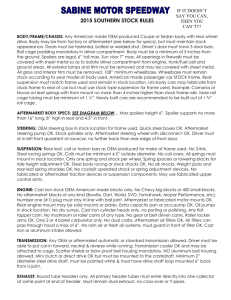NORTHWOOD UNIVERSITY SEMESTER TRANSITION SEMESTER
advertisement
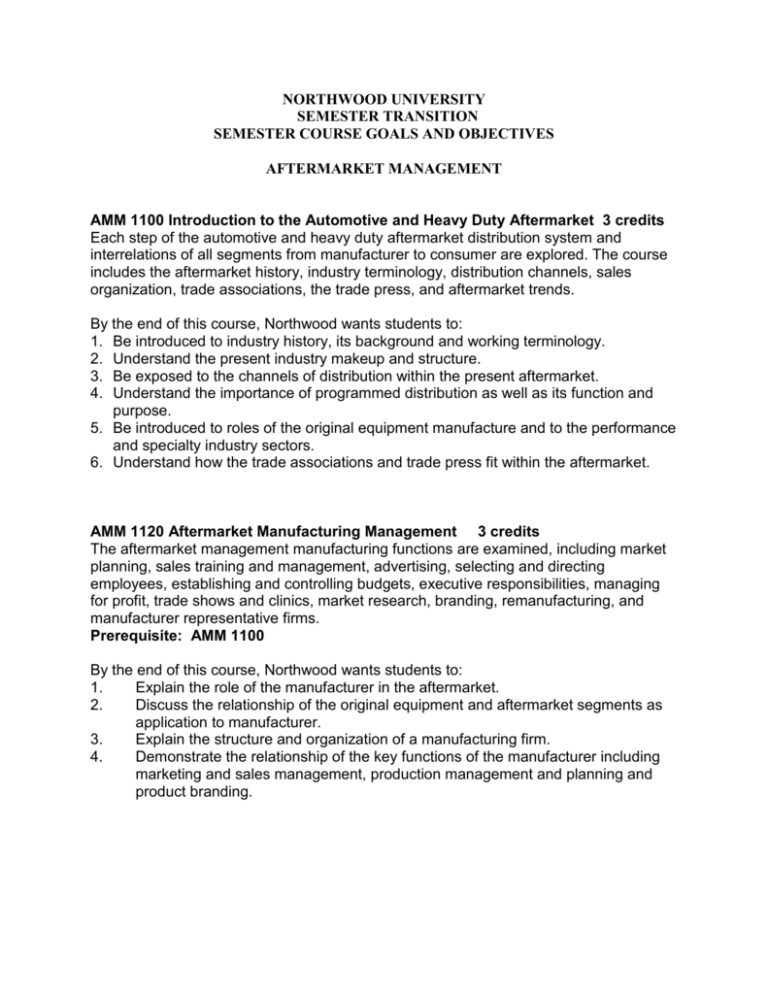
NORTHWOOD UNIVERSITY SEMESTER TRANSITION SEMESTER COURSE GOALS AND OBJECTIVES AFTERMARKET MANAGEMENT AMM 1100 Introduction to the Automotive and Heavy Duty Aftermarket 3 credits Each step of the automotive and heavy duty aftermarket distribution system and interrelations of all segments from manufacturer to consumer are explored. The course includes the aftermarket history, industry terminology, distribution channels, sales organization, trade associations, the trade press, and aftermarket trends. By the end of this course, Northwood wants students to: 1. Be introduced to industry history, its background and working terminology. 2. Understand the present industry makeup and structure. 3. Be exposed to the channels of distribution within the present aftermarket. 4. Understand the importance of programmed distribution as well as its function and purpose. 5. Be introduced to roles of the original equipment manufacture and to the performance and specialty industry sectors. 6. Understand how the trade associations and trade press fit within the aftermarket. AMM 1120 Aftermarket Manufacturing Management 3 credits The aftermarket management manufacturing functions are examined, including market planning, sales training and management, advertising, selecting and directing employees, establishing and controlling budgets, executive responsibilities, managing for profit, trade shows and clinics, market research, branding, remanufacturing, and manufacturer representative firms. Prerequisite: AMM 1100 By the end of this course, Northwood wants students to: 1. Explain the role of the manufacturer in the aftermarket. 2. Discuss the relationship of the original equipment and aftermarket segments as application to manufacturer. 3. Explain the structure and organization of a manufacturing firm. 4. Demonstrate the relationship of the key functions of the manufacturer including marketing and sales management, production management and planning and product branding. AMM 2050 Automotive Retail/Wholesale Management 3 credits The organization, capitalization, layout, product lines, inventory control, purchasing, personnel, financial control and other management topics for the wholesale and retail segments of the automotive aftermarket are explored. Functions of consumer-oriented marketing are looked at for all segments. Includes retail attitude, pricing and promotion, retail/wholesale combinations, identity and store image, influence of aesthetics and design, purchasing procedures, employee hiring and personnel management, and merchandising and display. Prerequisite: AMM 1100 By the end of this course, Northwood wants students to: 1. Explain the role of distribution in the aftermarket 2. Describe the aftermarket distribution systems 3. Analyze the warehouse operations, regarding inventory, purchasing, product lines, sales promotion and outside sales operation. 4. Compare the trends in the changing warehouse distribution system including ownership and affiliation AMM 2100 Heavy Duty Parts and Service Marketing 3 credits The functions of each step of Heavy Duty Aftermarket Parts and Service Marketing and interrelations of all segments from manufacturer to consumers are explored, including industry terminology, channels of distribution, financial implications and supply chain marketing techniques aftermarket trends. The management of Heavy Duty aftermarket manufacturing is also examined, including market planning, sales training, market research, branding, remanufacturing and manufacturer representative firms. This course will also cover the function of the warehouse distributor within the automotive aftermarket. Prerequisite: AMM 1100 By the end of this course, Northwood wants students to: 1. Be introduced to industry history, its background and working terminology. 2. Understand the present industry makeup and structure. 3. Be exposed to the channels of distribution within the present aftermarket. 4. Understand the importance of programmed distribution as well as its function and purpose. 5. Be introduced to roles of the original equipment manufacture and to the performance and specialty industry sectors. 6. Understand how the trade associations and trade press fit within the aftermarket. 7. Have been exposed to a variety of methods of instruction including case studies and industry guest speakers. AMM 3500 Supply Chain Management 3 credits Explores the principal concepts of supply chain management, including generation of requirements, sourcing, pricing, and post-award activities. The supply chain management philosophy includes all internal functions plus external suppliers involved in the identification and fulfillment of needs for materials, equipment, and services. The course also covers basic principles and philosophies of quality control and quality management, the concept of the extended enterprise, and the importance of establishing the proper relationship with supplier companies. The basic three-tier supply chain typical of automotive manufacturing will be examined in detail. Prerequisite: MKT 3450 By the end of this course, Northwood wants students to: 1. Apply the principles and philosophies of quality control and quality management. 2. Develop and manage the firm’s supply strategy as an integrated whole 3. Collaborate with an organization’s IT function to develop a data management system that facilitates strategic supply planning 4. Understand the effect of supply chain management on net profits 5. Apply techniques and processes used by firms to design and manage their bases of supply to achieve strategic and profit objectives 6. Identify the advantages of specific potential supply alliances 7. Be able to monitor a firm’s supply chain environment 8. Develop creative solutions to supply chain problems and bottlenecks AMM 3600 Logistics and Supply Chain Management 3 credits Focuses on management of the flow of products from raw materials sourcing and acquisition through delivery to the final user. Current topics include logistics and transportation planning, information technology, response-based strategies, third party logistics, and relationship management. This course also discusses the role of logistics and distribution in the marketing process. Prerequisite: AMM 2050 By the end of this course, Northwood wants students to: 1. Evaluate the value of the supply chain in reducing logistic cost to increase profits. 2. Analyze the value of technologies in reducing cost of operation therefore increasing profits. 3. Evaluate the impact of cycle time manage on reducing cost. 4. Apply value chain and lean strategies to increase profits 5. Evaluate the value of the supply chain in reducing logistic cost to increase profits. 6. Analyze the value of technologies in reducing cost of operation therefore increasing profits. 7. Evaluate the impact of cycle time manage on reducing cost. 8. Apply value chain and lean strategies to increase profits AMM 3850 Special Topics 1 – 3 credits Various topics in aftermarket management. These may be one-time or occasional course offerings. Prerequisite: Dependent on specific course content AMM 3990 Internship 3 credits The internship (400 hours of paid employment) is designed to provide the student with supervised on-the-job training. A contract between the university, student, and employer provides the groundwork. Objectives, evaluation, written log, and a study of the organization are designed to provide a realistic learning experience. Prerequisite: AMM 2050 and Faculty Approval By the end of this course, Northwood wants students to: 1. Have had actual experience through on-the-job training 2. Be able to relate experiences to classroom instruction 3. Know the history of the business 4. Have experience in the hiring process 5. Have experience in the process of keeping a daily log. AMM 4040 Aftermarket Field Sales Management 3 credits The examination of field sales manager’s job activities. Subjects include selling skills, expense management, time management, merchandising/advertising plans, sales report writing/sales forecast plans, trade show management, and human resource skills. By the end of this course, Northwood wants students to: 1. Analysis the role of the Aftermarket Sales Manager and the scope of his or her roles and responsibilities to the factory they represent and their clientele. 2. Evaluate selling skills that will prepare the manager to compete in the aftermarket area from prospecting to closing the sale, handling objectives and making the presentation. 3. Evaluate the development of effective travel plans with respect to expense management and budgeting. 4. Discover a new and effective approach for the better use of our 24-hour day in a time management study. 5. Evaluate function including marketing plans, sales reports, sales forecasting and the part reporting relates to accountability. 6. 7. 8. 9. 10. 11. View merchandising/ advertising from a different perspective relative to the management of co-op funds, developing sales promotions and a media study of one media versa another. Conduct actual market research surveys in the automotive aftermarket and readied the data for corporate use. Analyze the sale manager’s responsibility to human resources from interviewing, hiring and training to measurement of productivity and completion of annual personnel appraisals. The variables of the direct company representatives versus the agency rep. will have been explored. Understand how professional management communications help bridge the gap between the field and corporate management teams from conferences to the marketing plan. Acquire a wider perspective for the direct aftermarket account, relative to the traditional, programs and national account status and the policies and procedures they conform to. Interact with aftermarket field sales managers representing various automotive parts and/or accessories manufacture. AMM 4120 Current Issues in Global Aftermarket 3 credits A current issues study confronting the aftermarket with emphasis on the changing distribution channels and their effect on manufacturing. Concepts included are traditional and retail distribution and how these changes will be managed in the multinational business environment. By the end of this course, Northwood wants students to: 1. Analyze the global market as it relates to selling American products into to these markets. 2. Develop a marketing plan to obtain share in a specific foreign market. 3. Evaluate the pros and cons of entering the market and determine from what you have learned whether to enter or not based on your research. AMM 4130 Aftermarket Management Research 3 credits Individual research assignments and projects, based on the establishment of a new, student-selected aftermarket business, are required, with instructor guidance and supplementary material provided. Includes location and business type, advertising, merchandising and promotion, personnel requirements, pricing and inventory, building, design and layout, product and service selection and financial considerations. Prerequisites: AMM 2050 and AMM 3500 By the end of this course, Northwood wants students to: 1. Apply the skills learned over the past four years and to there a work environment. 2. Develop a sales forecasting and describe how sales forecast, budget, and organization relate to the business operation. 3. Analyze the budgeting process and how it will affect the profitability of a company. 4. Create a proposal and execute a sales plan and the value of the controls of this plan.


